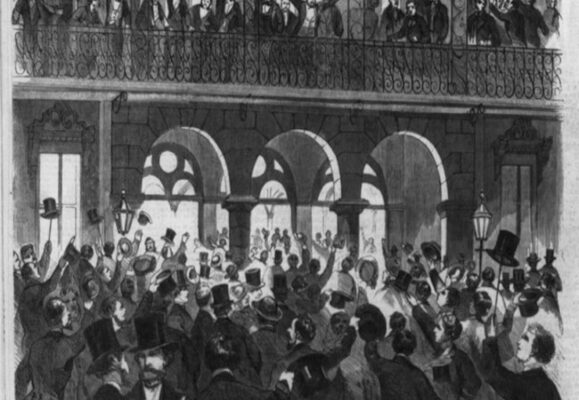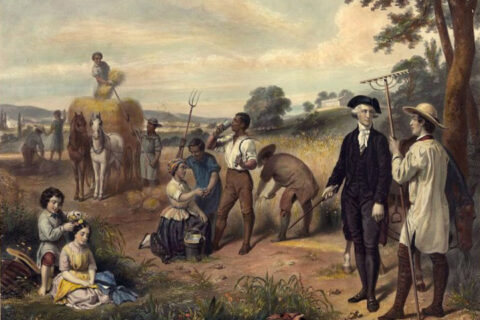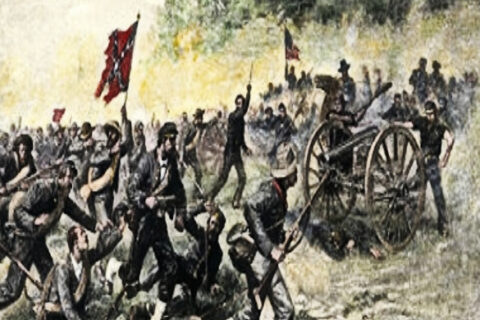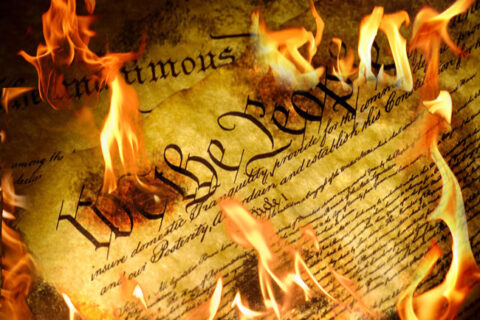State Secession Documents
With their actions and words, the states of the Upper South made it clear that Lincoln’s call for volunteers, state sovereignty, and self-government were the primary causes of secession.
Arkansas
“If we go to the North we become instruments in the hands of Lincoln to coerce the seceding states. To this a large number of the people will never consent.”
The True Democrat, Little Rock, Arkansas, March 15, 1861
Before Lincoln’s call for volunteers, the people of Arkansas voted to stay in the Union by a vote of 23,626 to 17,927. On March 4, 1861, the Arkansas convention, led by a unionist president, voted to remain in the Union. However, on March 12, 1861, The True Democrat warned, “If Lincoln attempts to carry out the doctrines of his inauguration and to coerce the seceding states, that forces us at once to take our position by their side.”
On May 6, 1861, after Lincoln’s call for men, Arkansas officials gathered to revote. This time, the result was 65-5 in favor of secession. In response to Lincoln’s call for volunteers, Henry Rector, the Governor of Arkansas, said, “The people of this Commonwealth are free men, not slaves, and will defend to the last extremity, their honor, lives, and property, against northern mendacity and usurpation.” Arkansans’ before and after votes and their declaration for secession demonstrate their motives for joining the Confederacy. The relevant section of the secession ordinance reads:
“Whereas… Lincoln… has, in the face of resolutions passed by this convention, pledging the State of Arkansas to resist to the last extremity any attempt on the part of such power to coerce any State that had seceded from the old Union, proclaimed to the world that war should be waged against such States until they should be compelled to submit to their rule, and large forces to accomplish this have by this same power been called out, and are now being marshaled to carry out this inhuman design; and to longer submit to such rule, or remain in the old Union of the United States, would be disgraceful and ruinous to the State of Arkansas.”
Arkansas State Convention
Virginia
“Secession placed no State in so embarrassing a position as the great Commonwealth of Virginia… There is no doubt that the great body of its citizens were opposed to the state’s seceding, but they were equally opposed to the coercion of the States which had already seceded.”
George Stillman Hillard, Life and Campaigns of George B McClellan
After the secession of South Carolina, Virginia stayed in the Union working to restore the seceding states back into the Union. However, on January 7, 1861, Virginia passed an anti-coercion resolution, by a vote of 112-5, describing the right of secession and state sovereignty. This declared that Virginia would oppose any attempt at coercion by the federal government. The resolution declares, “We will resist the same by all the means in our power.” The Virginia governor declared, “I will regard an attempt to pass federal troops across the territory of Virginia, for the purpose of coercing a Southern seceding state, as an act of invasion, which should be met and repelled.” The General Assembly: “Resolved… that the basis of all just government is the “consent of the governed,” and that such consent is the sanction of free, as force is the sanction of despotic, governments. That where this consent exists, there, whatever the form of the government, is liberty, and where it is wanting, there, whatever the form of the government, is tyranny.” However, on April 4, 1861, Virginia voted to stay in the Union by a 2-1 margin.
Likewise, decades earlier, during the tariff controversy between South Carolina and the federal government the then-Governor of Virginia said if any federal soldiers were to step on the soil of Virginia to coerce South Carolina to obey the federal tariffs they had nullified, it would happen only over his dead body. Such was the conviction of Virginians against tyranny; it was no different in 1860. By calling for volunteers, Lincoln was ignoring Virginia’s stance and resolve.
So, when Lincoln called upon Virginia to supply troops to invade the Cotton States, Virginia’s decision was predictable. Like most Virginians, Robert E. Lee expressed his distaste for coercion when he wrote to his son George Washington Custis Lee in 1861, “A union that can be only maintained by swords and bayonets… has no charm for me.” To Virginians, it was a clear distinction between government cohesion and liberty.
“As soon as it was known, that it was the intention of the Northern president to usurp war-making powers, and wage war against sovereign states of the Confederacy and that Virginia was called on to contribute men and money….no one doubted what her action would be… when the Union became an engine for oppression… she could not hesitate to throw herself on the side of freedom.”
Richmond Whig, Editorial, April 19, 1861
Virginia voters gathered again after Lincoln’s call for troops, and by a vote of 126,000 to 20,400, they left the Union. In his book, Reluctant Confederates, Daniel Crofts shows the great impact Lincoln’s call for volunteers had on Virginians. Croft reports on the celebration of Virginians in Rockbridge County, who, after Fort Sumter, put up a Confederate flag in celebration. In response, pro-unionist Virginians, who were by far the more numerous, erected a new, more enormous flagpole and put an American eagle on it. However, after Lincoln’s call for volunteers, those same unionists who had put the pole up with the American eagle, threw it down. Rockbridge County, which had been majority unionist, then voted 1,728 to 1 for secession.
In the book, Three Months in the Southern States, Englishman Lt.-Colonel Arthur J. Fremantle wrote about a conversation he had with a Virginia woman who said that: “She had stuck fast to the Union until Lincoln’s proclamation calling out 75,000 men to coerce the South, which converted her and such a number of others into strong secessionists.” Likewise, Confederate artilleryman William Thomas Poague wrote, “Had Lincoln not made war upon the South, Virginia would not have left the Union.”
“Let us consider for a moment the results of a consolidated government, resting on force, as proposed by the dominant party at the North….a consolidated despotism, upheld by the sword and cemented by fear… now it [the Union] has been seized upon by a sectional party, it is claimed that its powers are omnipotent, its will absolute, and it must and will maintain its supremacy, in spite of states and people, at the point of the sword.”
Richmond Whig, Editorial, April 10, 1861
Moreover, Governor John Letcher, (who wanted Virginia to abolish slavery) opposed secession before Lincoln’s call for volunteers. After Lincoln’s call, however, he became a firm secessionist.
“The President of the United States, in plain violation of the Constitution, issued a proclamation calling for a force of seventy-five thousand men, to cause the laws of the United states to be duly executed over a people who are no longer a part of the Union, and in said proclamation threatens to exert this unusual force to compel obedience to his mandates; and whereas, the General Assembly of Virginia, by a majority approaching to entire unanimity, declared at its last session that the State of Virginia would consider such an exertion of force as a virtual declaration of war, to be resisted by all the power at the command of Virginia.”
John Letcher, Governor of Virginia
Virginia did not give a lengthy declaration of why it left the Union, just a short ordinance of secession and a mention of Lincoln’s call for men.
The people of Virginia, in their ratification of the Constitution of the United States of America… declared that the powers granted under the said Constitution were derived from the people of the United States, and might be resumed whensoever the same should be perverted to their injury and oppression; and the Federal Government, having perverted said powers, not only to the injury of the people of Virginia but to the oppression of the Southern slaveholding States.“
It was not Northern coercion alone that Virginia objected to. When South Carolina and Mississippi were considering passing laws that would negatively affect Virginia financially unless they joined the Confederacy, Governor Letcher said, “I will resist the coercion of Virginia into the adoption of a line of policy, whenever the attempt is made by Northern or Southern states.”
Tennessee
On February 9, Tennessee voters turned down secession by a 4-1 margin. However, things transformed radically after Lincoln’s call for volunteers. Governor Isham Harris wrote President Lincoln saying that if the Federal Government would “coerce” the seceded states into returning, Tennessee had no choice but to join its Southern neighbors. He wrote, “Tennessee will not furnish a single man for purposes of coercion, but 50,000 if necessary for the defense of our rights, and those of our Southern brothers.”
Harper’s Weekly quotes the Nashville Dispatch on April 13, stating: “An enthusiastic public meeting was held here tonight. Resolutions were unanimously adopted, condemning the Administration for the present state of affairs, and sympathizing with the South.” Harper’s Weekly also quoted a Memphis paper saying, “There are no Union men now here.” On May 9, in an address to the people of Tennessee, Governor Harris said, “Force, when attempted, changes the whole character of the Government; making it a military despotism, and those that submit become the abject slaves of power. The people of Tennessee have fully understood this important fact, and hence their anxiety to stay the hand of coercion. They well know that the subjugation of the seceded States involved their own destruction.”
Harris and the people of Tennessee realized that cooperating in the subjugation of the Cotton States meant accepting their own future subjugation. Governor Harris recalled the Tennessee legislature on May 6 for another vote; voters would then approve secession on June 8 by a 2-1 margin. Reconciliation with a coercive government was out of the question; the Union was no longer. The Founder’s Republic had vanished.
“If ever thus restored, it must, by the very act, cease to be a Union of free and independent States, such as our fathers established. It will become a consolidated centralized Government, without liberty or equality, in which some will reign and others serve the few tyrannize and the many suffer. It would be the greatest folly to hope for the reconstruction of a peaceful Union… The Federal Union of the States, thus practically dissolved, can never be restored.”
Isham G. Harris, Senate Journal of the Second Extra Session of the Thirty-Third General Assembly of the State of Tennessee
North Carolina
“I have to say in reply that I regard the levy of troops made by the Administration for the purpose of subjugating the States of the South, as in violation of the Constitution and a usurpation of power. I can be no party to this wicked violation of the laws of the country, and to this war upon the liberties of a free people. You can get no troops from North Carolina.”
John Ellis, Governor of North Carolina, Raleigh, April 15, 1861
Before Lincoln’s call to invade the Cotton States, support for the Union was overwhelming in North Carolina; they did not even vote on secession. However, after Lincoln’s call for war, they unanimously adopted a secession ordinance. The same issue of Harper’s Weekly quoted a dispatch from Wilmington, North Carolina: “The Proclamation is received with perfect contempt and indignation. The Union men openly denounce the Administration. The greatest possible unanimity prevails.” The effects were felt across political lines. McPherson writes, “Even the previously unionist mountain counties, seemed to favor secession.”
Governor Ellis’ proclamation on April 17 clarified why North Carolina stood with the South: “Lincoln has made a call for 75,000 men to be employed for the invasion of the peaceful homes of the South, and for the violent subversion of the liberties of a free people… this high-handed act of tyrannical outrage is not only in violation of all constitutional law, in utter disregard of every sentiment of humanity and Christian civilization… but is a direct step towards the subjugation of the whole South, and the conversion of a free Republic, inherited from our fathers, into a military despotism.”
Missouri
“Sir… Your requisition, in my judgment, is illegal, unconstitutional, and revolutionary in its objects, inhuman and diabolical, and can not be complied with. Not one man will, of the State of Missouri, furnish or carry on such an unholy crusade.”
Missouri Governor Claiborne Jackson, Jefferson City, April 17, 1861
Missouri was almost entirely pro-Union. When Confederates sent delegates to Missouri to convince the state to join the South, they were booed and jeered so loudly that none could hear them. On March 21, 1861, the Missouri Convention voted 98-1 against secession, but they, like Kentucky, kept their neutrality.
However, many in the state became outraged that their state sovereignty had been violated during the “Camp Jackson Affair.” Union commander Nathaniel Lyon arrested the Missouri State Brigade, whom he feared were planning to seize the arsenal in St. Louis, and federal soldiers killed dozens of citizens during ensuing riots. Since the federal government violated the state’s neutral position, support for secession grew within the state. James McPherson wrote, “The events in St. Louis pushed many conditional unionists into the ranks of secessionists.” Lyon then pushed the governor and state legislature out of Jefferson City, creating more anti-union sentiment. These events led to the end of neutrality, which resulted in both a pro-Confederate and pro-Union government within the state. On November 28, the Confederate Congress accepted Missouri as the 12th Confederate state. Pro-Confederate Missouri’s reasons for secession centered around constitutional violations by the Lincoln Administration.
“Whereas the Government of the United States… has wantonly violated the compact originally made between said Government and the State of Missouri, by invading with hostile armies the soil of the State, attacking and making prisoners the militia while legally assembled under the State laws, forcibly occupying the State capitol, and attempting through the instrumentality of domestic traitors to usurp the State government, seizing and destroying private property, and murdering with fiendish malignity peaceable citizens, men, women, and children, together with other acts of atrocity, indicating a deep-settled hostility toward the people of Missouri and their institutions; and Whereas the present Administration of the Government of the United States has utterly ignored the Constitution, subverted the Government as constructed and intended by its makers, and established a despotic and arbitrary power instead thereof.”
Missouri Causes of Secession
Kentucky
By a 3 to 1 margin, Kentucky voted to remain neutral, but after Lincoln’s call for volunteers, support for the South began to spread. The Kentucky Governor wrote, “President Lincoln, I will send not a man nor a dollar for the wicked purpose of subduing my sister Southern states.” On April 16, 1861, Governor B. Magoffin wrote to Simon Cameron, Secretary of War stating: “Your dispatch is received. In answer, I say emphatically that Kentucky will furnish no troops for the wicked purpose of subduing her sister Southern States.”
However, the state’s neutrality stance was violated by Southern troops. In reaction, Kentucky would officially support the Union. Yet a pro-Confederate government was established on December 10, 1861, and was accepted into the Confederacy by President Jefferson Davis as the 13th Confederate state. This Confederate government gave its causes of secession centered on limited government, Northern violations of the Constitution, and states’ rights.
“Whereas, the Federal Constitution, which created the Government of the United States, was declared by the framers thereof to be the supreme law of the land, and was intended to limit and did expressly limit the powers of said Government to certain general specified purposes, and did expressly reserve to the States and people all other powers whatever, and the President and Congress have treated this supreme law of the Union with contempt and usurped to themselves the power to interfere with the rights and liberties of the States and the people against the expressed provisions of the Constitution, and have thus substituted for the highest forms of national liberty and constitutional government a central despotism founded upon the ignorant prejudices of the masses of Northern society, and instead of giving protection with the Constitution to the people of fifteen States of this Union have turned loose upon them the unrestrained and raging passions of mobs and fanatics, and because we now seek to hold our liberties, our property, our homes, and our families under the protection of the reserved powers of the States, have blockaded our ports, invaded our soil, and waged war upon our people for the purpose of subjugating us to their will; and Whereas, our honor and our duty to posterity demand that we shall not relinquish our own liberty and shall not abandon the right of our descendants and the world to the inestimable blessings of constitutional government.: therefore, be it ordained, that we do hereby forever sever our connection with the Government of the United States.”
Declaration of Causes of Secession Kentucky
Slavery’s Impact on the Secession of the Upper South
“It was necessary to put the South at a moral disadvantage by transforming the contest from a war waged against States fighting for their Independence into a war waged against States fighting for the maintenance and extension of slavery… and the world, it might be hoped, would see it a moral war, not a political; and the sympathy of nations would begin to run for the North, not for the South.”
Woodrow Wilson, A History of The American People
Slavery’s involvement as a cause for secession in the Upper South is overstated. The states of the Upper South had protection for their slave property whether they stayed in the Union or joined the Confederacy. When the Deep South states left the Union, more slave states remained in the Union than joined the Confederacy. Most Upper South state declarations did not even mention slavery; if they did, it was only in passing and usually associated with violations of states’ rights or the Constitution. Instead, they heavily spoke on states’ rights, state sovereignty, and Lincoln’s call for volunteers as the reasons for secession. Those states had previously chosen to stay with the Union before Lincoln’s call but could no longer remain under a government of force.
Slavery was Safer in the Union Than the Confederacy
“Seven-tenths of our people owned no slaves at all, and to say the least of it, felt no great and enduring enthusiasm for its preservation, especially when it seemed to them that it was in no danger.”
John G. Barrett, The Civil War in North Carolina
The Union would protect slavery better than a Confederacy. Slavery was constitutionally protected in both the Northern and Southern states for the entirety of the Civil War. Moreover, Lincoln and the North supported the Corwin Amendment, which would permanently enshrine slavery in the U.S. Constitution. In his first inaugural address, Lincoln said this of the proposed amendment, “To the effect that the Federal Government shall never interfere with the domestic institutions of the States, including that of persons held to service… holding such a provision to now be implied constitutional law, I have no objection to its being made express and irrevocable.”
“No amendment shall be made to the Constitution which will authorize or give Congress the power to abolish or interfere, within any State, with the domestic institutions thereof, including that of persons held to labor or service by the laws of said State.”
Corwin Amendment
The U.S. Supreme Court supported the fugitive slave laws, allowing federally funded agents to return runaway slaves to their masters. On the other hand, the Confederacy was unable to protect slaveowners when slaves fled to the North. In his inaugural address, Lincoln pointed this out, stating, “while fugitive slaves, now only partially surrendered, would not be surrendered at all by the other.”
The 1860 Republican Platform Plank 4 said that slavery was a state issue, and they would not interfere with it in states that already had slaves. In his inaugural address, Lincoln said, “I have no purpose, directly or indirectly, to interfere with the institution of slavery in the States where it exists. I believe I have no lawful right to do so, and I have no inclination to do so.” Likewise, on May 26, 1861, General McClellan stated, “Not only will we abstain from all such interference (with slaves), we will, on the contrary, with an iron hand crush any attempt at insurrection on their part.” It is no wonder a leader of the Whig Party in Missouri said, “Howard County is true to the Union. Our slaveholders think it is the sure bulwark of our slave property.”
Even after the Deep South left the Union, the federal government decided it would not end slavery, in the House in February and the Senate on March 2, 1861. On July 22, 1861, Congress declared, “This war is not waged, nor (the) purpose of overthrowing… the rights or established institutions of those states.” On October 8, 1861, the Washington D.C. newspaper, The National Intelligencer, published, “The existing war had no direct relation to slavery.” On November 7, 1861, Commanding General McClellan said, “The issue for which we are fighting, that issue is the preservation of the Union… I express the feelings and opinions of the president when I say that we are fighting only to preserve the integrity of the Union.” On August 15, 1864, long after the Emancipation Proclamation, Lincoln said, “So long as I am President. It shall be carried on for the sole purpose of restoring the Union.”
This is not to say that no one in the Upper South was upset over the Republican’s intrusion into the states’ rights on this issue in the Western Territories. There was a minor secession movement within the Upper South on the issue of slavery, especially in Virginia and Arkansas, but they were a minority. In fact, after Lincoln’s call for troops, many slave owners in the Upper South argued to stay in the Union since Lincoln was powerless to interfere with slavery.
“Is there any good reason why we should change our position? I believe that so far as the North is concerned, the prospect for the full recognition of Southern rights is better than it was at the time of Lincoln’s election, or at any time within several years before. The Governors of several Northern States, including the great States of New York and Pennsylvania, have recommended the faithful observance of all the laws intended for the protection of slave property, and the repeal of all the personal liberty bills… Lincoln’s administration is powerless to harm us. Before its close, his party will be scattered into fragments.”
Rep. Thomas N. Crumpler of Ashe County, North Carolina

Jeb Smith is the author of four books, the most recent being Missing Monarchy: Correcting Misconceptions About The Middle Ages, Medieval Kingship, Democracy, And Liberty. Before that, he published The Road Goes Ever On and On: A New Perspective on J. R. R. Tolkien and Middle-earth and also authored Defending Dixie’s Land: What Every American Should Know About The South And The Civil War, written under the name Isaac C. Bishop. Smith has authored dozens of articles in various publications, including History is Now Magazine, The Postil Magazine, Medieval History, Medieval Magazine, and Fellowship & Fairydust and featured on various podcasts including The Lepanto Institute.







A tad long, but excellent excerpts to prove the point that coercion was the breaking point for the states of the upper South. It also bears mentioning that Lincoln prosecuted his tyranny even in states such as Missouri who had declared neutrality, as in the Palmyra Massacre of Oct. 18, 1862. Kind of like George W., who after the false flag Twin Towers attack, launched Operation Infinite Justice (which was anything but), pontificating: “You’re either for us or against us.” Tyrants don’t stop at insulting you. They rub your face in their lies!
Excellent.I loved it.Such great information and this is what should have been taught in schools and colleges.This country truly was lost when Lincoln destroyed what the Founders intended.There are no great men left except in small numbers as there were then who defended their God given rights.The Jews have printed nothing but lies about our Holy Cause.God uses the internet to get the truth to us and you are part of this important work.This ugly,mongrel nation befits its wretched and hideous creator Lincoln.What a great White paradise it could have been.But our South will be recreated in Heaven so we should not despair of never seeing it.Thank you Father for all you give us daily and for this site and its writers and commenters.Christ is Lord.
Great article. What else is there to be said? A couple years ago I visited DC for the first time. I visited the Old Stone House, which is the oldest structure on its original foundation in the city. Inside is a placard that tells about how slaves worked IN DC until 1862. I thought that was funny since we were taught that DC was full of people who despised slavery, and there wouldn’t have been any Southern politicians in DC at that time, so who owned them? Northern men? Actually Lincoln only ever freed slaves in one area: DC. He never freed slaves living in northern states, or southern states. So it’s very ironic he even needed to do that in DC in the first place, and disappointing for those who believe the propaganda, to hear he didn’t free anyone living other areas.